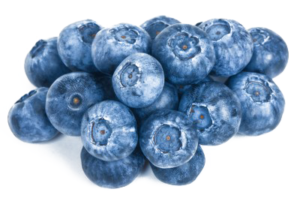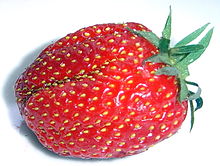 This study showed an association of eating lots of flavonoid rich foods (strawberries, blueberries, cherries, blackberries, red wine, apples, pears, and citrus products) and lower rates of erectile dysfunction. A higher intake of several flavonoids also reduces diabetes and cardiovascular disease risk. Keep in mind that erectile dysfunction is thought to be of vascular etiology (the cause) and so shares risk factors (such as hypertension, obesity, and smoking) with cardiovascular disease. Studies have shown that lifestyle factors such as plenty of exercise, being of normal weight, and a Mediterranean style diet rich in whole grains, fruit, vegetables, nuts, legumes, and olive oil was associated with both lower rates of erectile dysfunction and an improvement in erectile function in men. So don't focus just on the flavonoids, but on the whole lifestyle package. From Science Daily:
This study showed an association of eating lots of flavonoid rich foods (strawberries, blueberries, cherries, blackberries, red wine, apples, pears, and citrus products) and lower rates of erectile dysfunction. A higher intake of several flavonoids also reduces diabetes and cardiovascular disease risk. Keep in mind that erectile dysfunction is thought to be of vascular etiology (the cause) and so shares risk factors (such as hypertension, obesity, and smoking) with cardiovascular disease. Studies have shown that lifestyle factors such as plenty of exercise, being of normal weight, and a Mediterranean style diet rich in whole grains, fruit, vegetables, nuts, legumes, and olive oil was associated with both lower rates of erectile dysfunction and an improvement in erectile function in men. So don't focus just on the flavonoids, but on the whole lifestyle package. From Science Daily:
Blueberries, citrus fruits, red wine associated with reduced erectile dysfunction
Flavonoid-rich foods are associated with a reduced risk of erectile dysfunction -- according to a new collaborative study from the University of East Anglia (UEA) and Harvard University. Research published in The American Journal of Clinical Nutrition reveals that eating foods rich in certain flavonoids is associated with a reduced risk of erectile dysfunction in men, with the greatest benefit in those under 70. Of all the different flavonoids, Anthocyanins (found in blueberries, cherries, blackberries, radishes and blackcurrant), flavanones and flavones (found in citrus fruits) were found to offer the greatest benefits in preventing the condition.
It is already known that increased exercise can improve erectile function, but this research shows that eating a flavonoid-rich diet is as good for erectile function as briskly walking for up to five hours a week. The study also showed that a higher total fruit intake was associated with a 14 per cent reduction in the risk of erectile dysfunction. And that a combination of consuming flavonoid-rich foods with exercise can reduce the risk by 21 per cent.
More than 50,000 middle aged men were included in this large population based study. They were asked about their ability to have and maintain an erection sufficient for intercourse -- dating back to 1986. Data on dietary intake was also collected every four years.....More than one third of the men surveyed reported suffering new onset erectile dysfunction. But those who consumed a diet rich in anthocyanins, flavones and flavanones were less likely to suffer the condition.
Prof Cassidy said: "The top sources of anthocyanins, flavones and flavanones consumed in the US are strawberries, blueberries, red wine, apples, pears, and citrus products.""We also found that the benefits were strongest among younger men," she added. The team also looked at other lifestyle factors and found that men who consumed a high intake of anthocyanins and flavanones and who were also physically active had the lowest risk of erectile dysfunction.
 Once again a study finds that eating berries (this time blueberries) is associated with health benefits - that the blueberries improved both blood vessel functioning and blood pressure. This multi-part European study was conducted on both humans and mice. The researchers specifically looked at what component of blueberries had the beneficial effects on blood pressure and came to the conclusion that it was the anthocyanins in the blueberries. Anthocyanins are the blue, violet, or red flavonoid pigments found in berries and other plants.
Once again a study finds that eating berries (this time blueberries) is associated with health benefits - that the blueberries improved both blood vessel functioning and blood pressure. This multi-part European study was conducted on both humans and mice. The researchers specifically looked at what component of blueberries had the beneficial effects on blood pressure and came to the conclusion that it was the anthocyanins in the blueberries. Anthocyanins are the blue, violet, or red flavonoid pigments found in berries and other plants.
 This study showed an association of eating lots of flavonoid rich foods (strawberries, blueberries, cherries, blackberries, red wine, apples, pears, and citrus products) and lower rates of erectile dysfunction. A higher intake of several flavonoids also reduces diabetes and cardiovascular disease risk. Keep in mind that erectile dysfunction is thought to be of vascular etiology (the cause) and so shares risk factors (such as hypertension, obesity, and smoking) with cardiovascular disease. Studies have shown that
This study showed an association of eating lots of flavonoid rich foods (strawberries, blueberries, cherries, blackberries, red wine, apples, pears, and citrus products) and lower rates of erectile dysfunction. A higher intake of several flavonoids also reduces diabetes and cardiovascular disease risk. Keep in mind that erectile dysfunction is thought to be of vascular etiology (the cause) and so shares risk factors (such as hypertension, obesity, and smoking) with cardiovascular disease. Studies have shown that  Please note: 500 g (or half a kilo) is 1 pound or about 3 1/3 cups of whole strawberries. From Science Daily:
Please note: 500 g (or half a kilo) is 1 pound or about 3 1/3 cups of whole strawberries. From Science Daily: